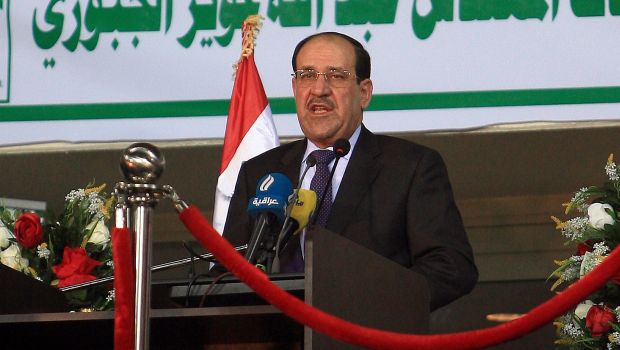
In this picture taken on Saturday, Oct. 12, 2013 Iraqi Prime Minister Nouri Al-Maliki speaks during the opening day of Sport City in Basra, Iraq. (AP Photo/Nabil al-Jurani)
Baghdad, Asharq Al-Awsat—Iraqi Prime Minister Nouri Al-Maliki said on Wednesday that Al-Qaeda has resumed its terrorist activities in the country, and called on tribes in the western provinces to confront elements affiliated with the terrorist group.
Only days before his visit to Washington to discuss the security situation in Iraq, Maliki announced his country’s readiness to host an international conference on terrorism.
“Iraq is subjected to a genocide targeting all of its people,” the Iraqi premier said. Violence in Iraq had affected “all [national] components equally,” he added.
Maliki announced that Al-Qaeda has resumed its “role in destroying houses, killing citizens and bombing government directorates,” adding, “those who have allied with [Al-Qaeda] have realized that what it wants is to destroy everything that has been built in this country.”
The Iraqi prime minister called on the country’s tribes to step up efforts to “thwart plots aimed at fragmenting national unity, targeting the political process and provoking divisions among Iraqis.”
Maliki said that a unified front has begun to emerge composed of “all [social] components and segments, security apparatuses, tribes and all of the wise, faithful and honorable [people] who have become targets for Al-Qaeda.”
Izzat Al-Shabandar, an MP for the State of Law Coalition, told Asharq Al-Awsat that there was a link between anti-government protests and the recent resurgence of terrorism from Al-Qaeda linked groups in the country.
Shabandar spoke of two groups of protesters “one that supports negotiations with the Iraqi government which is the majority and one that objects to negotiate which is the minority.”
Fares Ibrahim, a member of the Sons of Iraq in Anbar province told Asharq Al-Awsat “Al-Maliki in his speech has diagnosed the status quo by considering that the role of our councils has become more significant than that of the security forces.”
Ibrahim said that tribal forces are working “in complete coordination with the [security] forces and apparatuses in order to confront Al-Qaeda and all of the outlawed groups.”
Responding to a question about the reason Al-Qaeda’s resumption of its activities, Ibrahim said: “The main factor in our estimation is the reshuffling of cards that occurred during the protests and rallies which have been exploited by numerous sides.”
“Therefore, no positive transformation will take place with regards to defeating Al-Qaeda without implementing arrest warrants issued against many of those involved in harboring Al-Qaeda members including tribal sheikhs with Ahmed Abu Reisha at the forefront and other sheikhs,” he added.
According to Ibrahim, the obvious weakness of Anbar Provincial Council has led many radical Islamist elements to sneak into the western Iraqi province.
